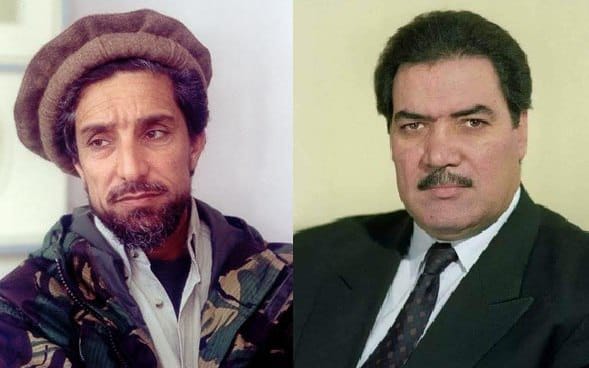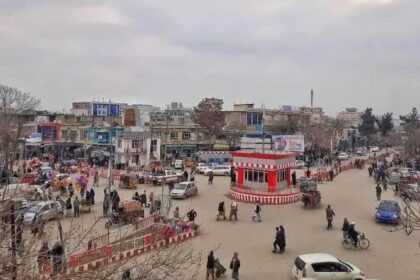RASC News Agency: Dr. Najibullah, the last leader and commander of the Democratic Party of Afghanistan, had rejected Ahmad Shah Massoud’s invitation, the national hero of the country, to safely leave Kabul and join the resistance front against the Pakistani proxy Taliban group. This rejection was based on tribal trust and linguistic affiliation to the Taliban. In the early hours of the Taliban’s occupation of Kabul, Dr. Najibullah, along with his brother, was hanged.
The Taliban group, for the first time in 1996, with direct support from the Pakistani military intelligence organization and Pakistani jihadist groups, launched an assault on Kabul. They captured the capital and shortly after occupying Kabul, they attacked the United Nations representative office, killing Dr. Najibullah and his brother Shapoor Ahmadzai, who were seeking refuge there, They then displayed their bodies at Ariana crossroad.
According to political analysts and historians, Dr. Najibullah’s biggest mistake that led to his murder was his trust in the ISI (Inter-Services Intelligence agency). Months before the fall of the Mujahideen government, the ISI had sent a message to him through Mrs. Najibullah in India, stating that the Taliban group represented Zahir Shah’s forces and that Dr. Najibullah would serve as the Prime Minister in Zahir Shah’s government. The Mujahideen government leaders, realizing that the main nature of the Taliban group was based on proxy forces of the Pakistani military intelligence, retreated from Kabul to prevent the massacre of the people of Kabul and its destruction. Before retreating from Kabul, Ahmad Shah Massoud, the national hero of Afghanistan, sent a message to Dr. Najibullah, stating that the United Nations representative office was not a safe place for him and he could go with them to the north. Dr. Najibullah, who belonged to the Ahmadzai Pashtons, was confident that the Taliban group, as fellow Pashtons, would welcome him as a hero and that he would fulfill his duty as the Prime Minister of Zahir Shah’s government, which it was said the Taliban group represented.
After the intensified attacks and invasions of the Mujahideen in northern Afghanistan, mainly under the leadership of Professor Burhanuddin Rabbani and Ahmad Shah Massoud, and the foundations of the democratic system of the People’s Democratic Party shaken to its core due to the withdrawal of the former Soviet Union forces, Dr. Najibullah’s government lost the ability to fight against the Mujahideen in the country’s provinces. As a result, one province after another fell into the hands of the Mujahideen until, according to some of Najibullah’s close associates, he chose to escape from Afghanistan. According to General Mohammad Nabi Azimi, despite the assurance he had given to the military commanders and senior members of his government on the night of April 14, 1992, after the intensified attacks and advance of the Mujahideen towards Kabul, Dr. Najibullah, under the pretext of welcoming the UN envoy “Benon Sevan”, attempted to secretly leave the country at midnight.
Mr. Azimi eloquently describes the escape of Najibullah, stating, “We could not believe that in our wakefulness we would be faced with such a bitter reality. A president, a party leader, a commander-in-chief of the army, not speaking the plain and simple truth but rather pursuing deception to deceive us. Receiving Sevan in the middle of the night with a converted car, without guards and customary protocols, by a president, was it possible? Was this an escape or betrayal? What name could we give it? Covert escape, shameful and accompanied by trickery and deceit, at the cost of deceiving and betraying our closest comrades. Abandoning a party, a government, and a nation without a destiny. Was this the same person who said, “Homeland or coffin?”
However, Faqir Mohammad Wadan, a supporter of Najibullah, said, “Mohammad Ismail Tokhi, the president’s aide at the time, told him to join him at the United Nations Headquarters in accordance with a telephone directive from the president’s residence to the UN office.”
After entering the UN office, Najibullah made a phone call to the special representative and head of the United Nations in Afghanistan, who was in Islamabad at the time, informing him of his escape from Afghanistan. Following that, Sevan assured Najibullah that he would arrive at Kabul International Airport by 1 a.m. and take him out of Afghanistan. However, upon his arrival, the military forces of the Islamic Society Council, known as the Shura-e-Nazar, took control of the airport and besieged Sevan’s aircraft after it landed at Kabul International Airport, denying him permission to disembark. Dr. Najibullah, the last remnants of the former Soviet-backed parties, sought refuge in the representative office of this organization in Kabul for a full five years, while Afghanistan was under the absolute rule of the Mujahideen whom he had fought and struggled against for years, leading to the massacre of thousands of Afghanistani citizens in support of the Russian soldiers. Yet, those very Mujahideen did not harm him and even tried to prevent him from falling into the hands of the Taliban. However, tribal and linguistic trust in proxy Pakistani forces proved fatal for him, costing him his life.
Meanwhile, before the city of Kabul was occupied by the Taliban, the national hero of Afghanistan had warned him of the dangers of falling into the clutches of the Taliban.
One of the drivers at the United Nations office in Kabul, who had accompanied Dr. Najibullah during his five years of refuge and witnessed the Taliban’s entry into the UN office and the transfer of Dr. Najibullah, said, “Dr. Najibullah usually slept during the day and sat in front of the satellite television channels in the evenings, which were accessible through the satellite antenna at the office. He also had relationships outside the office and received many letters. Many of these letters were brought by someone named Satar, who was said to be Dr. Najib’s Uncle, along with other relatives and friends who visited him on Fridays and Saturdays. They, especially Satar, had a special card from the Ministry of Security and easily entered and exited Dr. Najibullah’s quarters on holidays. In the afternoon of Friday, the 5th of Mizan (26th September, 1996), Dr. Najibullah asked me to go to Macrorayan and tell Satar that we only have tonight to talk, as I will most likely be going to Delhi tomorrow. I delivered the message to Satar. Minutes later, he came to the UN office with several relatives and friends. When Satar arrived, Dr. Najibullah told him that Ahmad Shah Massoud had sent a message through Fahim, his security minister, asking me to go to Panjshir. I replied that I will stay here. I am a refugee of the United Nations. He wishes that I spend another few years imprisoned in Panjshir, after spending five years in the UN office in Kabul.”
Meanwhile, according to the account of this UN employee who had served Dr. Najibullah for five years, “Dr. Najibullah seemed to be in good spirits. Satar, on the other hand, seemed more delighted and assured. While many of his associates left for their homes by midnight, Satar stayed at the UN office with Dr. Najibullah that night. They asked me to stay with them. In the early hours of the night, Satar, with anxiety, said, ‘Let’s see what they (the Taliban) will do, why are they late?’ Eventually, after midnight, a Taliban convoys carrying Datsun vehicles arrived at the entrance of the office. We all went out of the room. Three Taliban members got out of the Datsun car. One of them had a trimmed beard and spoke in Pashto, and said: where is Doctor Saheb. Dr. Najibullah replied that it was him. They told him to get into the Datsun car, as the head of the state was waiting for him at the Presidential Palace. Dr. Najibullah asked them to let him go to the Presidential Palace in broad daylight the next day, but they refused.
The next morning, I went to Ariana Intersection by bicycle. I saw Najib’s body hanging, and people crowded to see the corpse. Moments later, a Taliban Datsun convoy came back to the office and took his brother, Ahmadzai, with them, and shortly afterward, they hanged him as well.”






